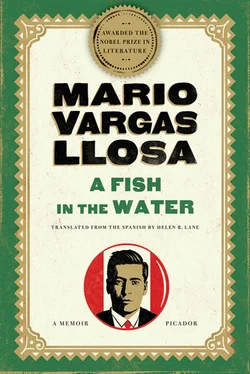Mario Vargas Llosa - A Fish in the Water - A Memoir
Здесь есть возможность читать онлайн «Mario Vargas Llosa - A Fish in the Water - A Memoir» весь текст электронной книги совершенно бесплатно (целиком полную версию без сокращений). В некоторых случаях можно слушать аудио, скачать через торрент в формате fb2 и присутствует краткое содержание. Год выпуска: 2015, Издательство: Macmillan, Жанр: Биографии и Мемуары, на английском языке. Описание произведения, (предисловие) а так же отзывы посетителей доступны на портале библиотеки ЛибКат.
- Название:A Fish in the Water: A Memoir
- Автор:
- Издательство:Macmillan
- Жанр:
- Год:2015
- ISBN:нет данных
- Рейтинг книги:3 / 5. Голосов: 1
-
Избранное:Добавить в избранное
- Отзывы:
-
Ваша оценка:
- 60
- 1
- 2
- 3
- 4
- 5
A Fish in the Water: A Memoir: краткое содержание, описание и аннотация
Предлагаем к чтению аннотацию, описание, краткое содержание или предисловие (зависит от того, что написал сам автор книги «A Fish in the Water: A Memoir»). Если вы не нашли необходимую информацию о книге — напишите в комментариях, мы постараемся отыскать её.
is a twofold book: a memoir of one of Latin America's most celebrated witers, beginning with his birth in 1936 in Arequipa, Peru; and the story of his organization of the reform movement which culminated in his bid for the Peruvian presidency in 1990.
A Fish in the Water: A Memoir — читать онлайн бесплатно полную книгу (весь текст) целиком
Ниже представлен текст книги, разбитый по страницам. Система сохранения места последней прочитанной страницы, позволяет с удобством читать онлайн бесплатно книгу «A Fish in the Water: A Memoir», без необходимости каждый раз заново искать на чём Вы остановились. Поставьте закладку, и сможете в любой момент перейти на страницу, на которой закончили чтение.
Интервал:
Закладка:
It was held under the auspices of the University of the Pacific, and the Jesuit Juan Julio Wicht performed veritable epic feats so as to make the whole thing come off impeccably. It took place on the night of June 3, in the Civic Center of Lima, filled to overflowing with three hundred journalists who had to be accredited beforehand, and twenty invited guests per candidate. It was directed by the journalist Guido Lombardi, who had very little to do, since, practically speaking, the debate never even got off the ground. Aware of the vulnerability of his situation once he would be obliged to refer specifically to a program for governing which he lacked entirely, Fujimori had brought along with him, written out, his speeches (each of them six minutes long) on all the subjects agreed on — Civil Peace, the Economic Program, Agricultural Development, Education, Work and the Informal Economy, and the Role of the State — and unbelievable as it may seem, he also had, all written out, the three-minute replies and one-minute rebuttals to which each of us had a right. As a result, during the so-called debate I felt, I imagine, like one of those chess players who match skills with robots or computers. I would speak and then Fujimori would read, although not even then did he fail to make mistakes in gender and number in Spanish now and again. Whoever had written those cards for him had tried to make up for the vacuousness of Cambio 90’s proposal by repeating ad nauseam all the clichés of the “dirty war”: the terrible economic shock, the million Peruvians who would lose their jobs (the average figure of half a million in the first round had become twice as many in the second), the disappearance of education for the poor, and the usual personal attacks (pornography, drug addiction, Uchuraccay). The spectacle of that tense man, frowning in concentration, reading in a monotone, without daring to depart from the libretto that he had brought with him on the little white cards, written out in large letters, despite my efforts to get him to answer concrete questions or specific charges having to do with his proposal for governing, had something about it that was half comic and half pathetic, and at times he made me feel ashamed, for him and for me as well. (He used up the five minutes allotted each one of us to say a few last words to the Peruvian people to wave a copy of the latest edition of the daily paper Ojo around and denounce the fact that it was already claiming that I had won the debate.)
What was owed to a people readying itself to exercise the most important right in a democracy — electing its leaders — was, surely, not this caricature of a debate. Or was it? Was it perhaps inevitable in a country with the characteristics of Peru? Nevertheless the practice of democracy in other poor countries with great economic and cultural inequalities does not descend to the depths it did in Peru, where every effort to elevate the campaign to a certain level of intellectual decorum was swept away by an uncontainable wave of demagoguery, lack of culture, shoddiness, and baseness. I learned many things in this election campaign, and the worst one of all was the discovery that the Peruvian crisis should not be measured only in terms of impoverishment, the decrease in standards of living, the aggravation of contrasts, the collapse of institutions, the acceleration of the rate of violence, but that all of that together had created conditions in which the functioning of democracy became a sort of parody, in which the most cynical and crafty always came up with the winning hand.
This said, if I must choose one episode of all the three years that the campaign lasted that leaves me with a feeling of satisfaction, it is my performance in that debate. For even though I went to it with no illusions as to the result of the election, I was then able, despite my adversary, or rather, thanks to him, to show to the Peruvian people, in those two and a half hours, the seriousness of our program of reforms and the preponderant role played in it by the fight against poverty, the gigantic effort that we had made to remove all those privileges that Peru had seen accumulating to ensure the prosperity of a privileged elite while the majority fell farther and farther behind.
The preparations were meticulous and amusing. During several days’ retreat, in Chosica, I had a number of training sessions with journalists who were friends of mine, such as Alfonso Baella, Fernando Viaña, and César Hildebrandt, who (the latter in particular) turned out to be better grounded and more incisive than the combatant I was preparing myself to confront. Moreover, taking time I really didn’t have, I had prepared a number of syntheses, as didactic as possible, of what we wanted to do in the domain of agriculture, in education, in the economy, in employment, and to restore civil peace. I kept to these subjects, despite the fact that, from time to time, I was obliged to allow myself to be distracted for a few moments so as to respond to the personal attacks, as when I asked him, since he boasted of his superiority as a technocrat, what had been done to the cows at the Agrarian University to make their production mysteriously decrease from 2,400 liters of milk per day to a mere 400 during the time that he was rector, or when, confronted with his concern because I had had an experience with drugs when I was fourteen years old, I advised him that he should worry, instead, about something more contemporary that concerned him more directly — like Madame Carmelí, the astrologist and candidate for a representative’s seat in the list of Cambio 90, who had been sentenced to ten years in prison for trafficking in drugs.
That night a great many people from the Front gathered at my house — there were members of the PPC, populists, members of SODE, mingling with the members of Libertad in an atmosphere that would have seemed impossible just a few weeks before — to watch with me the result of the opinion polls on the debate. Since all of them reported that I was the winner, and some of them gave me fifteen or twenty points’ advantage, many of the people gathered together there thought that thanks to the debate we had ensured our victory on June 10.
Even though, as I have already pointed out, almost all my efforts in the campaign for the second round of voting were concentrated on making tours around the periphery of Lima — the shantytowns and marginal districts that had crept across the deserts and the mountains until they had turned into a gigantic belt of poverty and misery that squeezed the old part of Lima more and more tightly — I also made two trips to the interior, to the two departamentos which I visited most often in those three years and to which I felt the closest ties: Arequipa and Piura. The results of the first round, in both cities, had saddened me, since, because of the affection that I had always felt for both and because of the dedication that I bestowed on both during the campaign, I took it for granted that there would be a sort of reciprocity and that the vote of the people of Piura and Arequipa would favor me. But we won only in Arequipa with 32.53 percent against a very high 31.68 percent for Cambio 90; in Piura the APRA won the first round with 26.09 percent compared to 25.91 for us. Considering the high demographic density of both regions, the Front decided that I should make one last tour of them, above all to explain to Piurans and Arequipans the range of activities of the PAS, which had begun work in both places. During my trip to Arequipa I was present at the signing of an accord between the Municipality of Cayma and the PAS of Arequipa for the installation of medical dispensaries and first-aid centers, thanks to the financing and professional support received by that program. (In April and May close to five hundred dispensaries were installed by the PAS in marginal sectors of Lima and the interior.)
Читать дальшеИнтервал:
Закладка:
Похожие книги на «A Fish in the Water: A Memoir»
Представляем Вашему вниманию похожие книги на «A Fish in the Water: A Memoir» списком для выбора. Мы отобрали схожую по названию и смыслу литературу в надежде предоставить читателям больше вариантов отыскать новые, интересные, ещё непрочитанные произведения.
Обсуждение, отзывы о книге «A Fish in the Water: A Memoir» и просто собственные мнения читателей. Оставьте ваши комментарии, напишите, что Вы думаете о произведении, его смысле или главных героях. Укажите что конкретно понравилось, а что нет, и почему Вы так считаете.












